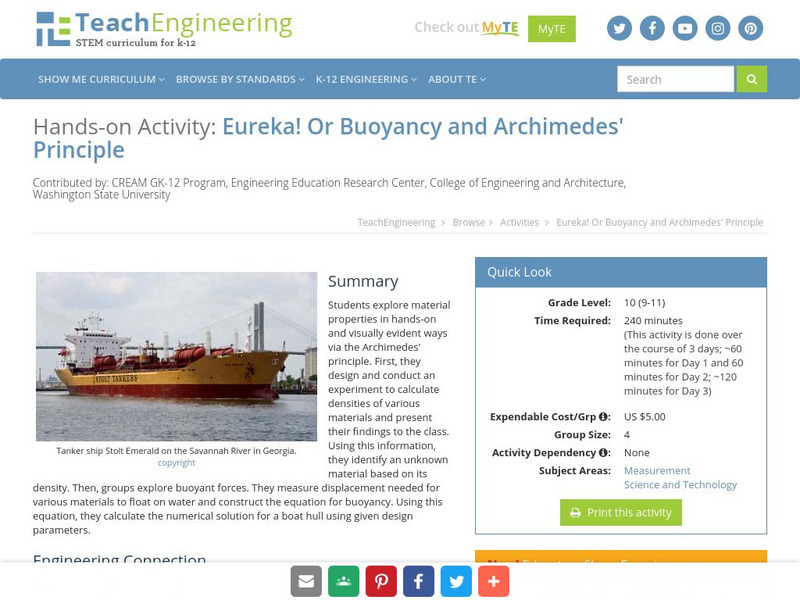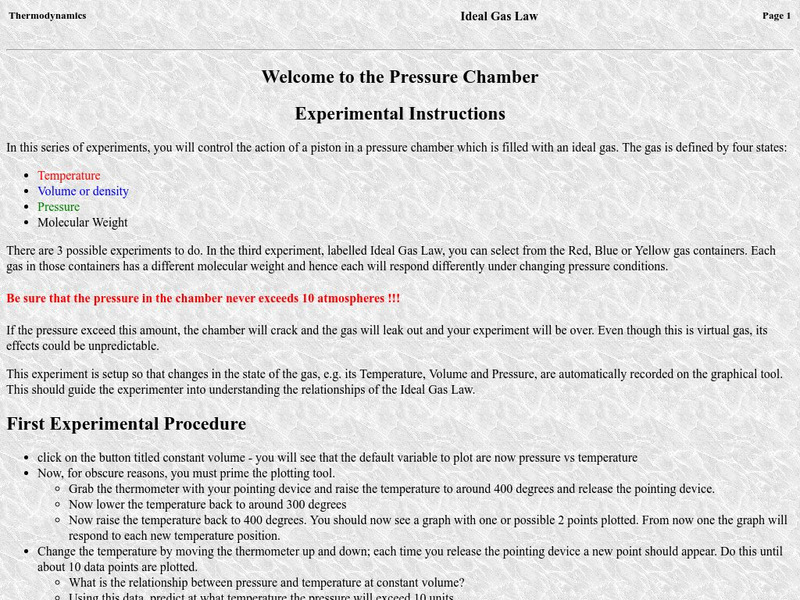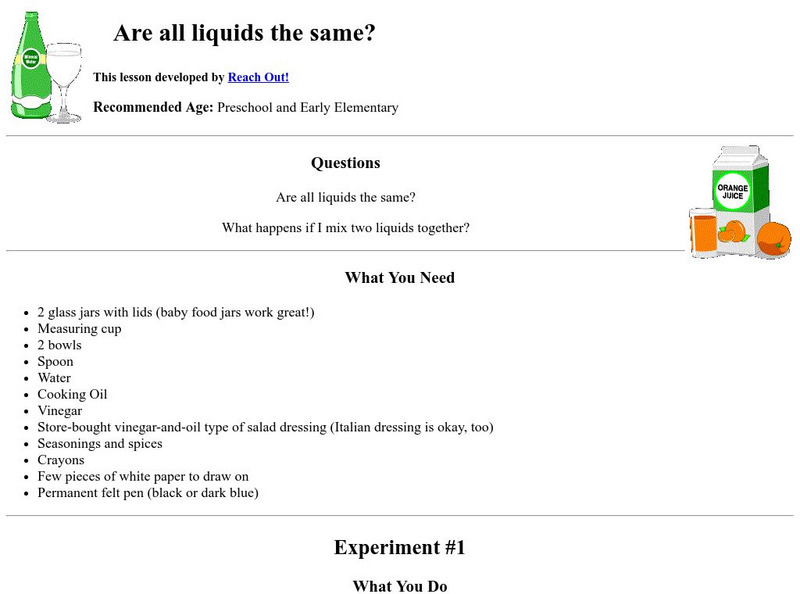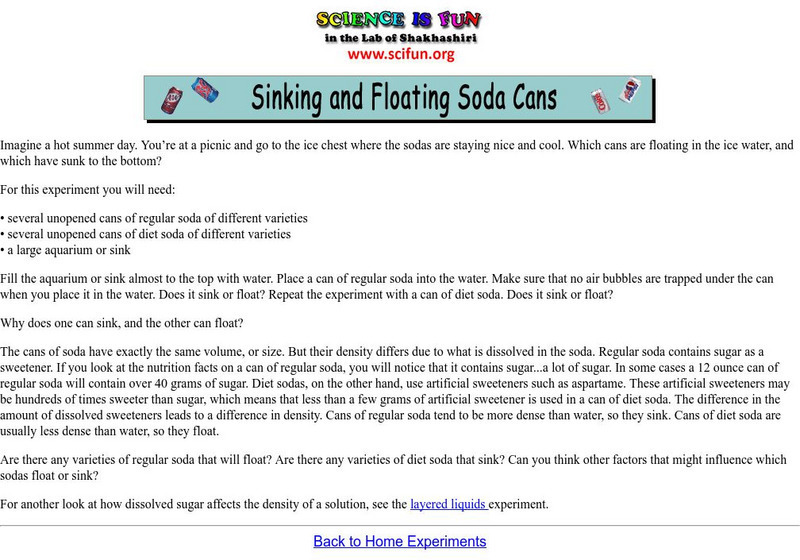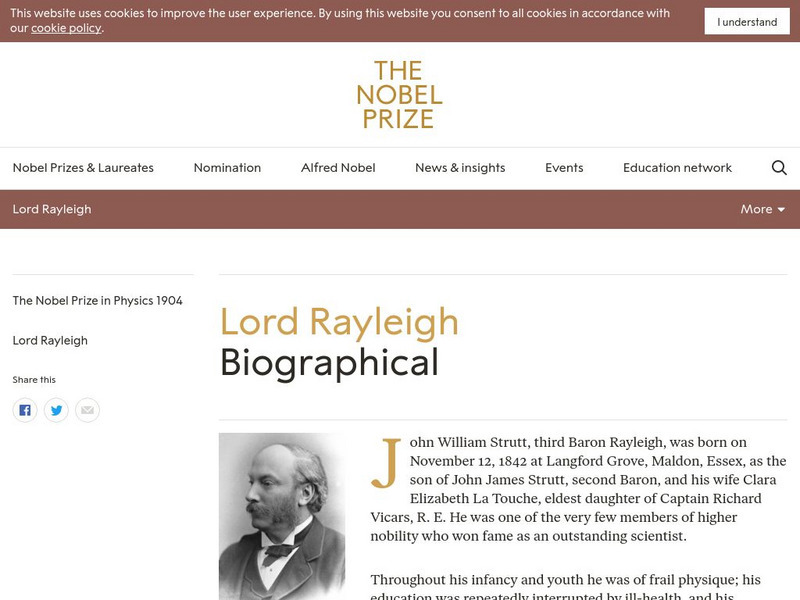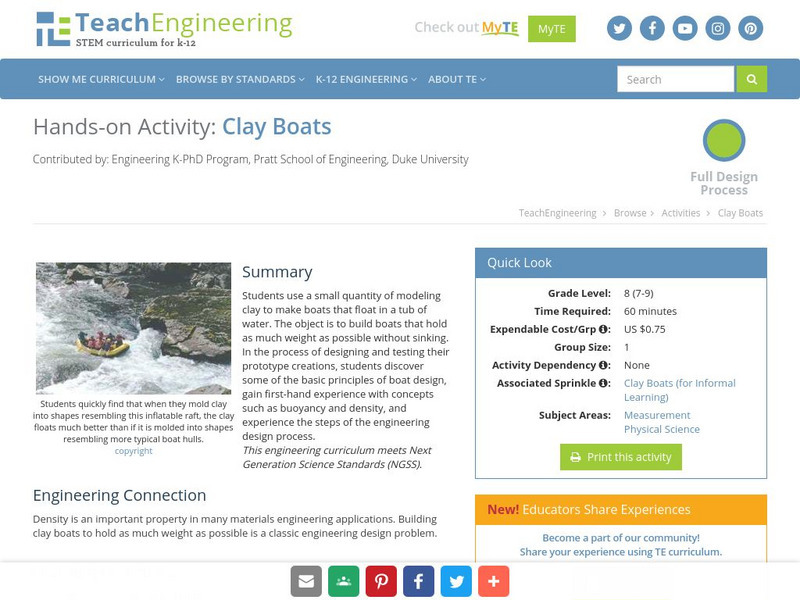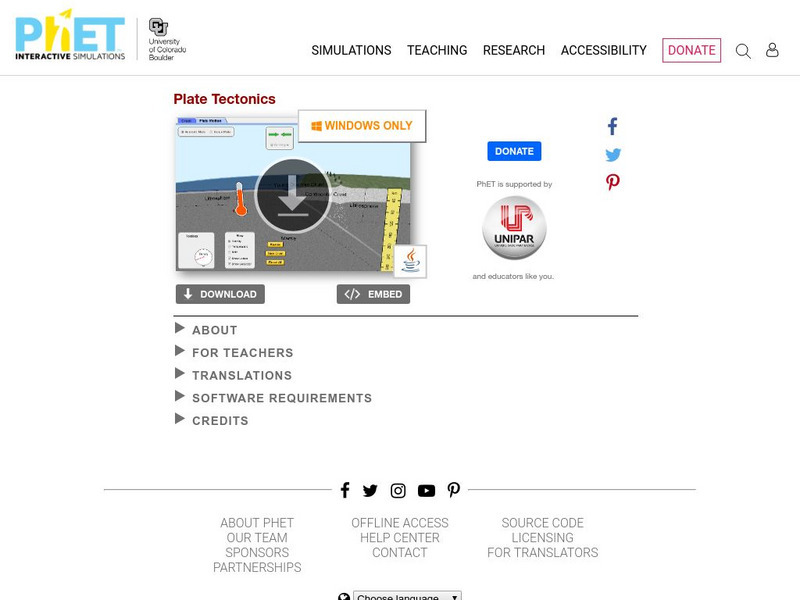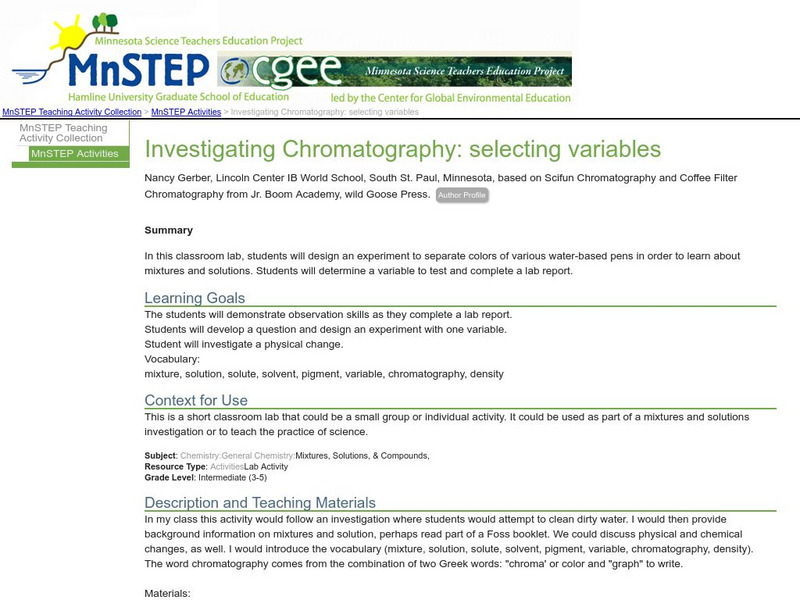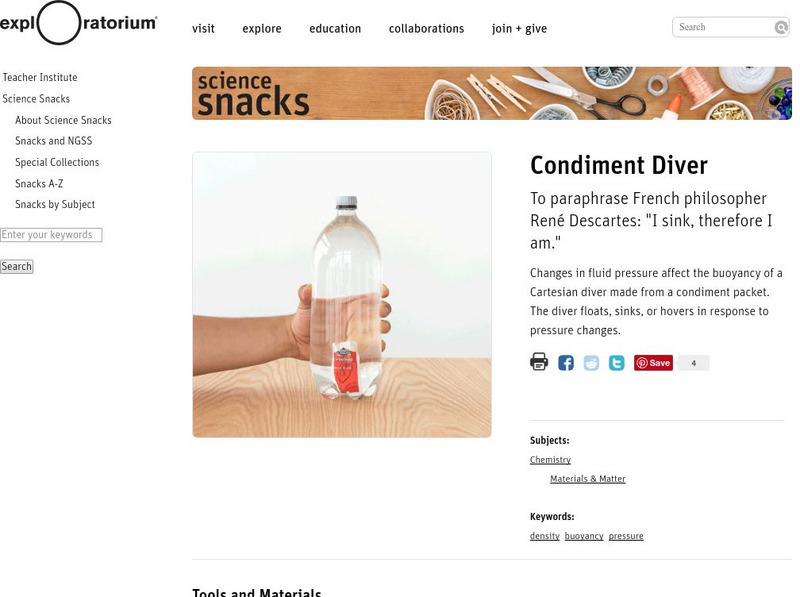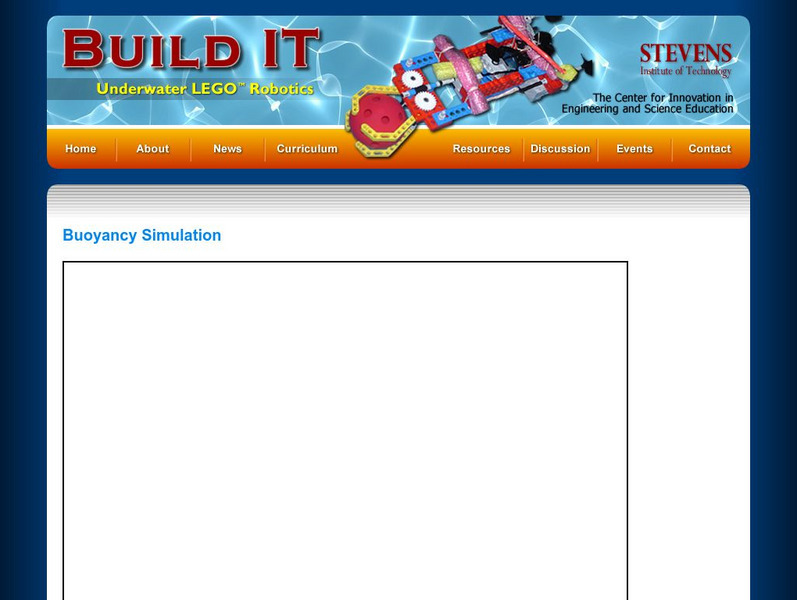TeachEngineering
Teach Engineering: Eureka! Or Buoyancy and Archimedes' Principle
Students explore material properties in hands-on and visually evident ways via the Archimedes' principle. First, they design and conduct an experiment to calculate densities of various materials and present their findings to the class....
Science Buddies
Science Buddies: Project Ideas: How Much Sugar Is Really in That Soda?
In this science fair project, use a precision hydrometer to measure the amount of sugar in soda. The Science Buddies project ideas are set up consistently beginning with an abstract, objective, and introduction, followed by a section on...
Science Buddies
Science Buddies: Project Ideas: What Makes Foams Stand Up Straight
In this food science fair project, students will determine which foods make good edible foams, with high volume and longevity. The Science Buddies project ideas are set up consistently beginning with an abstract, objective, and...
University of Oregon
Welcome to the Pressure Chamber
This site has an online experiment for testing the ideal gas law.
Science Buddies
Science Buddies: Buoyancy of Floating Cylinders
This project presents an interesting puzzle. A disk of wood will float face-up, that is, with its circular cross-section parallel to the surface of the water. A long log of wood, however, floats with the circular cross-section...
University of Chicago
Center for Astrophysical Research in Antarctica: Don't Be Too Flaky
After reading some facts about the properties of water, students conduct experiments to measure the relative densities of water, ice and snow and submit the results to the website.
Michigan Reach Out
Reach Out Michigan: Are All Liquids the Same
This experiment demonstrates the density of selected liquids.
Science is Fun
Science Is Fun: Dancing Raisins
An experiment in buoyancy which involves making raisins float by using carbonated soda pop. Students then try the same test with other materials. Instructions for making one's own carbonated liquid are also provided.
Science is Fun
Science Is Fun: Sinking and Floating Soda Cans
An experiment to determine if either a regular or a diet can of soda will float or sink when placed in water, and what causes this.
Chemistry Collective
Chem Collective: Current Collection of Virtual Lab Problems
A collection of over 30 virtual chemistry problems with accompanying interactive activities. Each problem includes a word file for potential differentiation in your classroom.
Museum of Science
Museum of Science and Industry: Online Science: Activities: Habitat Overcrowding
An experiment where several containers are set up with different numbers of seeds planted in each. The objective is to investigate how seed density affects the health of the plants that grow.
Scholastic
Scholastic: Dirtmeister's Science Lab: The Air Is There
An experiment to see how the temperature of an object affects how high it bounces. This site contains web links and notes for the teacher.
Nobel Media AB
The Nobel Prize: Lord Rayleigh Biographical
At this site from the Nobel e-Museum, you can read about the scientific work of Lord Rayleigh (1842-1919 CE). This article includes information on his education and experiments with light and sound waves.
Alabama Learning Exchange
Alex: Show Me the Money
Just what is a penny worth? Students explore various websites or printed fact sheet investigating the history and changes in density of pre- and post- 1982 pennies. They will also research the current price of copper and zinc and compare...
TeachEngineering
Teach Engineering: Clay Boats
Each student uses a small quantity of modeling clay to make a boat that will float in a tub of water. The object is to build a boat that will hold as much weight as possible without sinking. In the process of designing and testing their...
University of Colorado
University of Colorado: Ph Et Interactive Simulations: Ph Et: Interactive Simulations: Plate Tectonics
Students studying plate tectonics will better understand its concepts with this virtual experiment that tests how plates move on the surface of the earth. Temperature, composition, and thickness of plates can be changed to create new...
Science Education Resource Center at Carleton College
Serc: Investigating Chromatography: Selecting Variables
For this lab, students will demonstrate observation skills as they design an experiment to separate colors of various water-based pens in order to learn about mixtures and solutions. Students will determine a variable to test and...
Science Fun for Everyone
Science Fun: Water Fireworks
In this science experiment, you will learn about density while making water fireworks!
Science is Fun
Science Is Fun: Layered Liquids
An investigation into what properties liquids have that enable them to sit in separate layers in a container.
Exploratorium
Exploratorium: Science Snacks: Condiment Diver
Use a condiment packet as a Cartesian diver to show how pressure changes cause the "diver" to float, sink or hover.
Center for Innovation in Engineering and Science Education, Stevens Institute of Technology
Stevens Institute of Technology: Buoyancy Simulation
By choosing the mass, size, and time, students can experiment with whether the block floats or sinks in this simulation. Students have the option to display the forces and add a second block to the tank. Density is also shown to allow...
Other
Bigelow Laboratory for Ocean Sciences: Salinity and Deep Ocean Currents
For this activity, students will investigate how temperature and currents affect the salinity of ocean water, making predictions after studying ocean maps. It is recommended that teachers do the experiment themselves before presenting it...
Treehut
Suzy's World: How Come Some Liquids Don?t Mix?
This site from Suzy's World explores how and why certain liquids mix better than others. Content includes fun facts and a classroom experiment. This site also includes links to additional information on related subjects.
Other popular searches
- Liquid Density Experiments
- Density Experiments Physics
- Solid Density Experiments
- Water Density Experiments
- Glycerin Density Experiments
- Metals Density Experiments
- Wood Density Experiments
- Matter Density Experiments
- Density Experiments Bread
- Gycerin Density Experiments
- Density Experiments Sugar
- Gas Density Experiments


